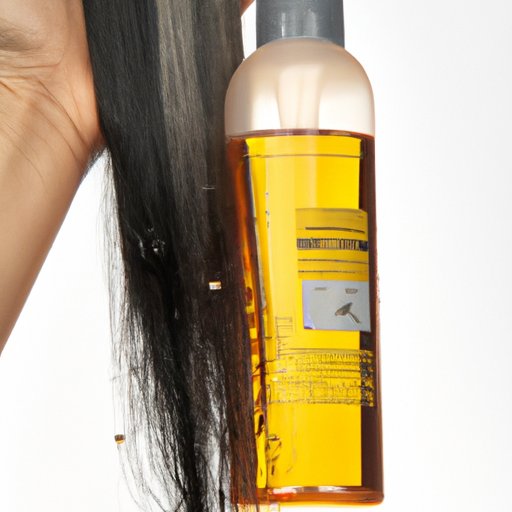Introduction
Sulfates are a type of surfactant, or detergent, that are used in many products, including shampoos and cleansers. They are effective at removing dirt and oil from the scalp, but they can also strip essential nutrients from the hair and cause damage. In this article, we’ll explore why sulfates are bad for hair, how to spot sulfate-containing products, and natural alternatives to these harmful ingredients.

How Sulfates Strip Hair of Essential Nutrients and Cause Damage
Sulfates are effective at cleansing the hair, but they do so by stripping away essential oils and proteins, such as keratin, which are necessary for strong, healthy hair. When these essential nutrients are removed, the hair becomes brittle and prone to breakage. Additionally, sulfates can also dry out the scalp and cause irritation.
The damage caused by sulfates varies depending on the type of product being used and the individual’s hair type. Generally, those with dry or damaged hair should be especially cautious when using sulfate-based products, as they can worsen the condition of the hair. Additionally, those with curly or coiled hair may find that sulfates strip away too much moisture, leaving the hair feeling dry and lifeless.
The Effects of Sulfates on Color-Treated Hair
Color-treated hair is especially vulnerable to the damaging effects of sulfates. This is because the chemicals used in the coloring process can leave the hair cuticle weakened and more susceptible to damage. As sulfates strip away the essential oils and proteins from the hair, they can further weaken the cuticle, leading to breakage and fading of the color.
Using sulfates on color-treated hair can also have long-term consequences. Over time, the buildup of sulfates can cause the hair to become dry and brittle, leading to split ends and breakage. Additionally, the continual stripping of the hair’s natural oils can leave it overly dry and prone to further damage.
How to Spot a Sulfate-Containing Hair Product
When shopping for hair care products, it is important to pay attention to the labels and look for words such as “sodium lauryl sulfate” or “sodium laureth sulfate”. These are two of the most common types of sulfates found in hair care products. Additionally, some companies use alternative terms for sulfates, such as “ethanolamine lauryl sulfate” or “ammonium laureth sulfate”, so it is important to be aware of these as well.
It is also helpful to look out for warning signs that a product contains sulfates. If the shampoo produces a thick lather or has a strong chemical smell, it likely contains sulfates. Additionally, if the product is labeled as a “clarifying” shampoo, it is likely to contain sulfates as these are designed to remove buildup from the hair.
Natural Alternatives to Sulfate-Based Products
Fortunately, there are many natural alternatives to sulfate-based products available. These include shampoos and conditioners made with natural ingredients such as coconut oil, jojoba oil, shea butter, and aloe vera. These ingredients are gentle on the hair and help to nourish and protect it without stripping away essential nutrients.
Additionally, many of these products are free from synthetic fragrances, dyes, and other harsh chemicals, making them safer for both the hair and the environment. Natural alternatives are also often more affordable than traditional sulfate-based products, making them an attractive option for those looking to switch up their hair care routine.
Understanding the Role of Sulfates in Your Hair Care Routine
Despite the damaging effects of sulfates, they still play an important role in keeping the hair clean and healthy. For this reason, it is important to understand the role of sulfates in your hair care routine and how to incorporate them without causing damage. To do this, start by using a sulfate-free shampoo once or twice a week and following up with a conditioner. Additionally, make sure to use a deep conditioning treatment once a month to help restore the hair’s natural oils.
If you decide to use a sulfate-based shampoo, take extra care to ensure that it does not remain on the hair for too long. Additionally, follow up with a deep conditioning treatment or mask to help replenish the lost nutrients. Finally, limit the use of sulfates to once or twice a week to minimize the risk of damage.

Tips for Maintaining Healthy Hair Despite Sulfates
In addition to reducing the amount of sulfates used in your hair care routine, there are several other steps you can take to maintain healthy hair despite sulfates. Start by avoiding heat styling tools such as curling irons and blow dryers, as these can cause additional damage to the hair. Additionally, use a wide-tooth comb or brush to detangle wet hair and avoid brushing it when it is dry.
Finally, make sure to use a deep conditioning treatment once a week and keep your scalp hydrated by using moisturizing masks and serums. These simple steps can go a long way towards preserving the health of your hair despite the damaging effects of sulfates.
Conclusion
Sulfates are a type of surfactant that are commonly used in hair care products, but they can be damaging to the hair, stripping away essential oils and proteins and leaving it dry and brittle. It is important to recognize sulfate-containing products and reduce the amount of sulfates used in order to minimize the damage they can cause. Additionally, natural alternatives, such as those made with coconut oil, jojoba oil, shea butter, and aloe vera, are available and can provide a gentler, more nourishing option for those looking to switch up their hair care routine.
By understanding the role of sulfates in hair care and taking proactive steps to reduce the amount used, you can maintain healthy, beautiful hair despite their damaging effects.


